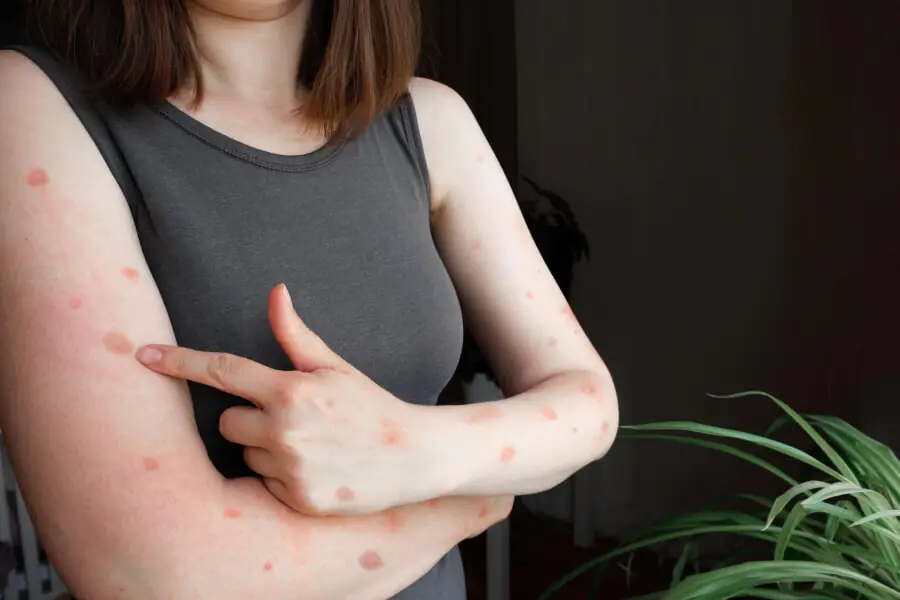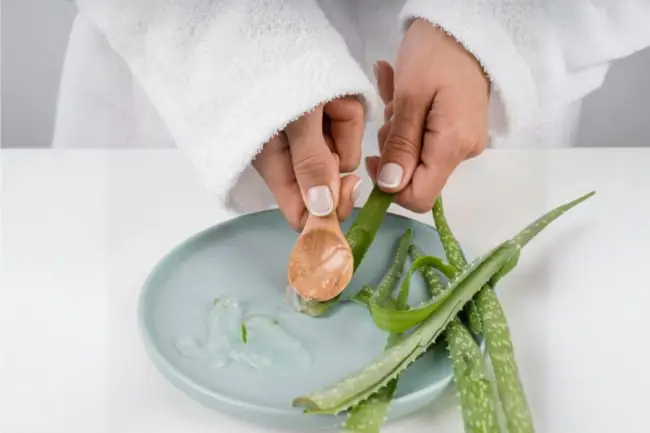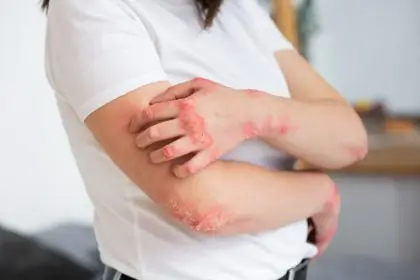If you’ve ever experienced hives, you know how uncomfortable and frustrating they can be. These itchy, raised welts can appear suddenly and disrupt your day-to-day life.
While conventional treatments can be effective, many people are turning to nature for relief.
Herbal remedies can help reduce hives symptoms naturally.
From soothing aloe vera to anti-inflammatory turmeric, discover how these natural solutions can provide comfort and support your skin’s health. Whether you’re seeking immediate relief or looking for long-term strategies, we’ve got you covered!
Hives and Its Causes
It is medically known as urticaria, which are those itchy, red welts that can appear seemingly out of nowhere. They often cause discomfort and can be triggered by various factors. While many seek medical treatments, plenty of natural remedies can effectively reduce its symptoms.
Causes of Hives
Understanding the triggers is the first step in finding relief. Here are some common causes:
- Allergens: Foods like nuts, shellfish, eggs, and dairy can provoke an allergic reaction. Environmental allergens such as pollen and pet dander are also common.
- Temperature Changes: Sudden exposure to heat or cold can lead to physical hives.
- Infections: Viral and bacterial infections can trigger it as part of the body’s immune response.
- Stress: Emotional stress can exacerbate existing hives or even trigger new ones.
- Medications: Certain medications, including antibiotics and non-steroidal anti-inflammatory drugs (NSAIDs), may cause allergic reactions resulting in hives.
Symptoms of Hives
Symptoms can vary widely, but common signs include:
- Raised, itchy welts on the skin that may vary in size.
- Swelling, known as angioedema, can occur around the eyes, lips, and throat.
- A burning or stinging sensation in addition to itching.
These symptoms can be distressing, but the good news is that natural remedies can help soothe the discomfort.
Types of Hives
It can be categorized into different types based on their duration and cause:
- Acute Hives: These last less than six weeks and often have identifiable triggers, such as food allergies.
- Chronic Hives: Present for longer than six weeks, chronic ones can sometimes occur without a clear cause.
- Physical Hives: Triggered by environmental factors like pressure, temperature, or sunlight.
Natural Remedies
Natural remedies can provide a holistic approach to managing it. Here’s a guide to effective treatments:
Home Remedies for Immediate Relief
For quick relief, consider trying these home remedies:
- Cold Compress: Applying a cold pack or cloth soaked in cold water can help numb the area and reduce swelling.
- Oatmeal Baths: Soaking in a bath with colloidal oatmeal can soothe irritated skin and reduce itching.
- Baking Soda Paste: Mix baking soda with a little water to form a paste and apply it to the affected areas to reduce itching.
Herbal Remedies
Several herbs have been shown to help manage its symptoms:
- Aloe Vera: This versatile plant is known for its anti-inflammatory properties. Applying fresh aloe vera gel to the skin can soothe irritated areas and promote healing.
- Nettle (Urtica dioica): Rich in antihistamines, nettle can help reduce allergic reactions. Drinking nettle tea or taking nettle supplements can provide relief from it.
- Turmeric (Curcuma longa): Known for its potent anti-inflammatory properties, turmeric can be consumed in tea or added to meals to help combat inflammation related to hives.
- Chamomile (Matricaria chamomilla): This calming herb can be used in tea form or applied as a cooled tea bag to the skin for soothing effects.
- Peppermint (Mentha piperita): The cooling sensation of peppermint can help relieve itching. Use peppermint oil diluted with carrier oil on affected areas.
Acupuncture as a Natural Treatment
Acupuncture, a traditional Chinese medicine practice, can be beneficial for treating hives. By inserting thin needles into specific points on the body, acupuncture aims to balance the body’s energy and reduce symptoms. Many find that it helps reduce stress and manage it effectively.
Supplements and Diet Changes
Adding specific supplements and dietary changes can also support your body’s ability to handle it:
Supplements
- Vitamin C: This powerful antioxidant can help lower histamine levels, potentially reducing the severity of hives. Consider increasing your intake of fruits like oranges, kiwi, and strawberries, or through supplements.
- Omega-3 Fatty Acids: Found in fish oil, omega-3s can reduce inflammation throughout the body. Consider adding fatty fish like salmon or walnuts into your diet.
- Quercetin: This plant flavonoid may help stabilize mast cells and reduce the release of histamine. Quercetin supplements can be an effective option.
Dietary Changes
- Eliminate Trigger Foods: If you suspect certain foods may be causing your hives, consider eliminating them from your diet for a while.
- Add Anti-Inflammatory Foods: Foods rich in antioxidants, such as berries, leafy greens, and turmeric, can help support your immune system and reduce inflammation.
Lifestyle Adjustments
Making a few lifestyle changes can also help manage and prevent it:
Suggestions for Lifestyle Changes to Prevent Hives
- Manage Stress: Engage in stress-reducing activities like yoga, meditation, or deep breathing exercises. This can help reduce the likelihood of hives related to stress.
- Stay Hydrated: Drink plenty of water to keep your skin hydrated and healthy, which can help reduce the severity of hives.
- Wear Loose Clothing: Go for loose, breathable fabrics to prevent irritation against sensitive skin.
- Lukewarm Showers: Hot showers can aggravate sensitive skin; choose lukewarm water instead.
When to Seek Medical Help
While natural remedies can be effective, it’s important to know when to seek medical assistance.
Signs That Natural Remedies Aren’t Sufficient
If you notice that symptoms persist or worsen despite trying natural treatments, it may be time to consult a healthcare professional.
Severe Symptoms Requiring Medical Attention
Seek immediate help if you experience:
- Difficulty breathing or swallowing.
- Swelling in the throat, mouth, or face.
- A rapid heartbeat or fainting.
Services and Treatments Provided by Medical Professionals
Medical professionals may prescribe antihistamines, corticosteroids, or other medications to help manage your symptoms effectively. They can also perform tests to determine the underlying cause.
Conclusion
Natural remedies offer a holistic approach to managing hives, providing comfort and relief from symptoms. From aloe vera to acupuncture, various options are available to help you feel better.
It’s important to monitor your condition and seek medical advice if necessary. Always consult with a healthcare professional before starting any new treatment, especially if you have pre-existing conditions or are taking medications.
For personalized advice, consider consulting with healthcare professionals or herbalists who can guide you on the best remedies and practices tailored to your needs.
FAQs
What herb gets rid of hives?
Nettle is known for its antihistamine properties and can help reduce allergic reactions, potentially alleviating hives.
What is the fastest way to cure hives?
Applying a cold compress or taking antihistamines can provide quick relief from hives symptoms.
What tea gets rid of hives?
Nettle and chamomile teas are both effective options for soothing inflammation and relieving symptoms.
What vitamin gets rid of hives?
Vitamin C may help lower histamine levels, which can reduce the severity and frequency of hives.







